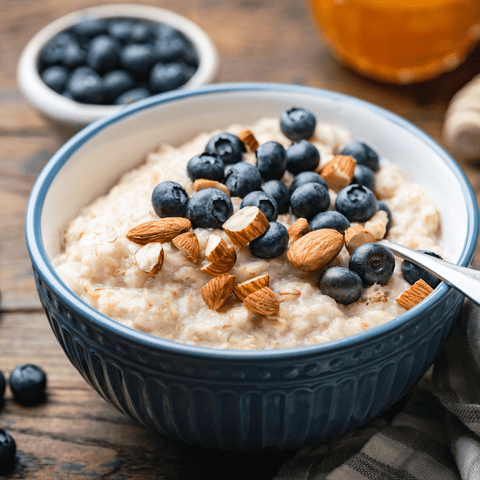Almond Nuts | Almonds
Deliciously fresh, raw, whole Almond nuts that are full of the essential nutrients you need daily.
Properties:
- May help prevent heart disease - Almonds specifically supply antioxidant flavonoids, plant-based compounds present in the skin of almonds that work with vitamin E to aid artery health and reduce inflammation
- Supports healthy brain function - Almonds nutrition is somewhat unique in that almonds contain Riboflavin and L-Carnitine, two key nutrients capable of positively affecting neurological activity and preventing cognitive decline
- Maintains skin health - Almonds are a great source of vitamin E and other antioxidants that nourish the skin and reduce signs of ageing
- Helps to control blood sugar levels - Almonds rich supply of Monounsaturated fatty acids help slow the rate at which glucose (sugar) is released into the bloodstream
- Aids weight loss - healthy fats and dietary fibre found in almonds nutrition aid in weight loss because they help you feel full
- May improve digestive health - almonds (especially the skin of almonds) contain pre-biotic components that help with digestion, detoxification and healthy bacterial growth within the microbiota/gut flora
- May help maintain dental and bone health - almonds are a good source of trace minerals, including magnesium and phosphorus, which play a role in building and maintaining strong teeth and bones.
Nutritional Value per 28g:
- 161 Calories, 6.1 g Carbohydrate, 5.9 g Protein, 13.8 g Fat, 3.4 g Fiber
Uses:
- Eaten raw or as a snack
- Used as a topping
- Grated or chopped to use for baking or in cereals
RDA is about ¼ cup at a time
Allergens:
Tree nuts

Disclaimer:
Products are produced in a factory that pack tree nuts, sesame, soya, gluten and dairy.
These delicious nuts are packed with protein, fiber, and healthy fats, making them the perfect snack to keep you feeling full and satisfied throughout the day. Our almonds are carefully selected to ensure they meet our strict quality standards, and are available in a variety of forms, including raw, roasted, and flavored. They're also a versatile ingredient in many recipes, from savory dishes to baked goods to smoothies. Whether you prefer them whole, sliced, or chopped, our almonds are a nutritious and delicious addition to any diet. Order now and experience the fresh, natural taste of our premium almond nuts.
Experience the perfect balance of taste and nutrition with our Premium Quality Almond Nuts. Sourced from the finest almond groves, our almond nuts are a flavorful, nutrient-rich addition to your healthy lifestyle.
Almond nuts are an all-natural, delicious snack that's packed with heart-healthy monounsaturated fats, protein, fiber, and essential vitamins and minerals. Our Premium Quality Almond Nuts not only taste great but also provide nutritional benefits, making them an ideal choice for a healthful snack or a versatile culinary ingredient.
The satisfying crunch of our almond nuts makes them a delightful standalone snack, but their rich, buttery flavor also complements a variety of dishes. Use them as a crunchy topping for salads, a flavorful addition to baked goods, or a protein-packed component in trail mix. You can also blend our almond nuts into a creamy almond butter or use them to make homemade almond milk.
Our almond nuts are carefully selected and processed to maintain their nutritional integrity. They're naturally gluten-free, non-GMO, and free from artificial additives and preservatives, aligning with our commitment to promoting health and wellness.
Embrace a healthy lifestyle with our Premium Quality Almond Nuts, the tastiest way to nourish your body. Experience the exceptional taste and nutritional benefits of our top-tier almond nuts today.
Some Facts About Almonds
Botanical Classification: Despite being commonly referred to as "nuts," almonds are technically drupes, which are fruits with a soft fleshy exterior and a hard interior shell containing the seed.

Origin: The almond tree is native to the Middle East, the Indian subcontinent, and North Africa.

Nutritional Value: Almonds are rich in monounsaturated fats, protein, fiber, vitamin E, and minerals such as magnesium, manganese, and copper. They are also a good source of antioxidants.
Health Benefits: Eating almonds can help lower LDL (low-density lipoprotein) cholesterol levels, reduce the risk of heart disease, improve blood sugar control, and provide satiety, thereby aiding in weight management.
Phytic Acid Content: Like many seeds, nuts, and grains, almonds contain phytic acid, an antinutrient that can bind minerals in the gut before they are absorbed. However, this effect is unlikely to cause nutrient deficiencies in people who consume a balanced diet.
Almond Milk: Almonds are often used to make almond milk, a popular dairy milk substitute. This beverage is made by grinding almonds, mixing them with water, and then straining the mixture.
Pollination: Almond trees are not self-pollinating and require bees or other insects to transfer pollen from one flower to another for fertilization. This has led to concerns about the sustainability of almond cultivation, given the worldwide decline in bee populations.
Almond Oil: Almond oil, especially sweet almond oil, is used in many cosmetic products due to its high levels of vitamin E and its potential to improve skin health.
Phenolic Compounds: Almonds contain a variety of phenolic compounds, which have antioxidant properties. These compounds contribute to the health benefits associated with almond consumption.
Almonds are the perfect solution for Athletes:
- Perfect Energy Boost: Almonds are a great source of energy due to their content of healthy fats, proteins, and carbohydrates. An ounce of almonds (approximately 23 almonds) contains about 160-170 calories, which can provide a quick energy boost. Athletes might consume almonds before a workout or competition for sustained energy. A great snack before a workout.
- Better Muscle Recovery: Almonds are rich in protein, which is necessary for muscle recovery and growth after strenuous physical activity. Consuming almonds post-workout can help repair muscle tissue and promote muscle growth.
- Bone Health: Almonds are a good source of calcium and magnesium, both of which are important for maintaining bone health. This is especially important for athletes to prevent injuries and maintain strong bones.
- Anti-inflammatory Properties: Almonds contain antioxidant compounds, such as vitamin E and flavonoids, which can help reduce inflammation in the body. This can help speed up recovery time after intense workouts.
- Heart Health: The monounsaturated fats in almonds can help lower LDL ("bad") cholesterol levels and increase HDL ("good") cholesterol levels. Regular almond consumption can therefore help athletes maintain heart health, which is crucial for endurance and overall performance.
- Weight Management: Almonds are high in dietary fiber and protein, both of which can promote feelings of fullness. This can help athletes manage their weight by preventing overeating.
- Gut Health: The fiber in almonds also supports digestive health by aiding regular bowel movements and promoting a healthy gut microbiome.
Athletes may consume almonds in various ways. They can be eaten raw as a snack, used as a topping for salads or yogurt, incorporated into smoothies for added protein and fiber, or consumed as almond butter. Almond milk can also be a good option for those who are lactose intolerant or follow a vegan diet.

Some Dishes That Include Almonds
Almonds are a versatile ingredient that can be used in a variety of delicious meals. Here are some great ideas:
Almond Crusted Chicken: Coat chicken breasts in a mixture of crushed almonds, breadcrumbs, garlic powder, and parmesan, then bake until golden and crispy. Serve with a side of steamed vegetables or a fresh salad.
Almond and Spinach Pesto Pasta: Blend almonds with fresh spinach, garlic, parmesan cheese, and olive oil to make a rich pesto. Toss it with your favorite pasta for a quick and nutritious meal.
Almond Butter Stir-Fry: Use almond butter to create a rich sauce for a stir-fry. Combine it with soy sauce, honey, and ginger, then toss with stir-fried vegetables and your choice of protein like tofu or chicken.
Almond and Apricot Biryani: Cook a fragrant biryani with almonds and dried apricots, adding spices like cumin, coriander, and cardamom. This dish is usually served with rice and is perfect for a hearty dinner.
Honey Almond Granola: Mix rolled oats, almonds, honey, and a touch of cinnamon, then bake until crunchy. This granola is perfect for breakfast or as a snack.
Almond Flour Pancakes: For a gluten-free breakfast, make pancakes using almond flour. Add a bit of vanilla and sweeten with maple syrup for a delicious start to your day.
Moroccan Almond and Vegetable Tagine: Slow cook a Moroccan-inspired tagine with almonds, chickpeas, and an array of vegetables like carrots, zucchini, and bell peppers, seasoned with spices like cinnamon, cumin, and turmeric.
Chocolate Almond Truffles: Mix finely ground almonds with melted chocolate, a bit of cream, and your choice of flavorings like orange zest or coffee. Chill, then roll into truffles for a decadent treat.
Almond and Berry Salad: Toss mixed greens with sliced almonds, fresh berries, goat cheese, and a balsamic vinaigrette for a refreshing and light salad.
Almond Crusted Salmon: Coat salmon fillets in a crust of crushed almonds and herbs, then bake or pan-sear. Serve with a side of roasted vegetables or a quinoa salad.
Why should you eat Almond Nuts?
Eating almonds offers a multitude of health benefits, making them a great addition to your diet. Here's why you should consider incorporating almond nuts into your daily routine:
-
Rich in Nutrients: Almonds are a powerhouse of essential nutrients. They are an excellent source of vitamin E, magnesium, and fiber. They also contain protein, healthy monounsaturated fats, and important minerals like manganese and copper.
-
Heart Health: Regular consumption of almonds has been linked to a reduced risk of heart disease. The monounsaturated fats, fiber, and antioxidants in almonds contribute to improved cholesterol levels and overall heart health.
-
Weight Management: Almonds can be a valuable addition to a weight management plan. Their high protein and fiber content can help you feel fuller for longer, reducing overall calorie intake. Despite being high in fat, almonds are not associated with weight gain when consumed in moderation.
-
Blood Sugar Control: The low glycemic index of almonds makes them suitable for diabetics. The magnesium in almonds may also play a role in controlling blood sugar levels, making them a diabetic-friendly snack.
-
Antioxidant Benefits: Almonds are a fantastic source of antioxidants, primarily concentrated in the brown layer of the skin. These antioxidants can protect against oxidative stress, which is linked to aging and diseases like cancer.
-
Gut Health: The fiber in almonds not only helps with digestion but also feeds the beneficial bacteria in your gut, promoting gut health.
-
Reduced Cancer Risk: Some studies suggest that the consumption of almonds may be associated with a lower risk of certain types of cancer, possibly due to their antioxidant content and beneficial fats.
-
Improved Skin Health: The high levels of vitamin E in almonds can benefit skin health, protecting it from damage caused by the sun and helping to maintain its elasticity and hydration.
-
Brain Health: Nutrients in almonds, like riboflavin and L-carnitine, are known to positively affect neurological activity and prevent cognitive decline. This makes almonds a brain-friendly food.
-
Versatility in Diet: Almonds are incredibly versatile and can be incorporated into various diets. They can be eaten raw or roasted, used in baking, added to salads, or ground into almond flour or almond butter.
What is the difference between Almond Nuts and other nuts?
Almonds, like other nuts, are highly nutritious and offer various health benefits. However, there are several distinct differences between almonds and other nuts in terms of nutritional content, health benefits, taste, and culinary uses. Here's a comparison highlighting these differences:
-
Nutritional Profile:
- Almonds: Almonds are particularly high in vitamin E, magnesium, and riboflavin. They are also a good source of fiber and protein. Notably, almonds contain more calcium than any other nut, making them an excellent choice for bone health.
- Other Nuts: While all nuts are nutritious, their profiles vary. For example, walnuts are rich in alpha-linolenic acid (ALA), a type of omega-3 fatty acid. Cashews are a good source of iron and zinc. Brazil nuts are extremely high in selenium.
-
Fat Content and Type:
- Almonds: They are high in monounsaturated fats, which are beneficial for heart health.
- Other Nuts: Different nuts have varying types of fat. For instance, walnuts contain a significant amount of polyunsaturated fats, including omega-3 fatty acids, which are also good for heart health.
-
Caloric Density:
- Almonds: They are moderately high in calories, but their high fiber content can help in appetite control.
- Other Nuts: Most nuts are calorie-dense, but the exact calorie count varies. Macadamia nuts, for example, are higher in calories and fat compared to others.
-
Antioxidant Content:
- Almonds: High in antioxidants, particularly vitamin E, which is good for skin health and may protect against heart disease and cancer.
- Other Nuts: Walnuts, pecans, and chestnuts, for example, have high levels of antioxidants, which can vary in type and amount.
-
Flavor and Culinary Use:
- Almonds: They have a slightly sweet and mild flavor, making them versatile in both sweet and savory dishes. They can be used in almond milk, almond flour, and almond butter.
- Other Nuts: Each nut has a unique flavor. For example, walnuts have a richer, earthier taste, while cashews are more creamy and buttery, influencing their use in culinary dishes.
-
Health Benefits:
- Almonds: Apart from being heart-friendly and good for skin health, they are also beneficial for blood sugar control and may help with weight management.
- Other Nuts: Each type of nut offers specific health benefits. For example, the omega-3 fatty acids in walnuts are good for brain health.
-
Allergenic Potential:
- Almonds: Like other nuts, almonds can be allergenic to some people.
- Other Nuts: The allergenic potential varies, with peanuts (technically legumes but often grouped with nuts) and tree nuts like cashews and walnuts commonly causing allergic reactions.
Orders are dispatched daily (except Saturday & Sundays – these orders will be packed and sent on Monday). Your order should be received within 2-5 business days.







